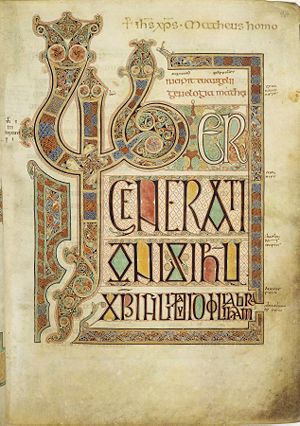
Folio 27r from the Lindisfarne Gospels contains the incipit Liber generationis of the Gospel of Matthew. (Photo credit: Wikipedia)
Since the beginning of the Christian era, Christmas has been celebrated in the liturgical calendar as the beginning of the promise that was fulfilled by the Resurrection, which is solemnized on Eastern Sunday. According to Gospel narratives, Christ was born into the world to redeem mankind and to rekindle hope. His Sermon on the Mount remains one of the great clarion calls to social justice:
"Now when Jesus saw the crowds, he went up on a mountainside and sat down. His disciples came to him, and he began to teach them. He said: Blessed are the poor in spirit, for theirs is the kingdom of heaven. Blessed are those who mourn, for they will be comforted. Blessed are the meek, for they will inherit the earth. Blessed are those who hunger and thirst for righteousness, for they will be filled. Blessed are the merciful, for they will be shown mercy. Blessed are the pure in heart, for they will see God. Blessed are the peacemakers, for they will be called children of God. Blessed are those who are persecuted because of righteousness, for theirs is the kingdom of heaven..."
The Gospel attributed to Matthew admonishes believers to practice charity:"Be careful not to practice your righteousness in front of others to be seen by them. If you do, you will have no reward from your Father in heaven." Christ warns against the accumulation of material goods [Matthew 6:16]: "Do not store up for yourselves treasures on earth, where moths and vermin destroy, and where thieves break in and steal..." [Matthew 6:19] Matthew also quotes Christ to the effect that "No one can serve two masters. Either he will hate the one and love the other, or he will be devoted to the one and despise the other. You cannot serve both God and Money." [Matthew 6:24]. Lastly, Matthew tells us that, "Then Jesus said to his disciples, 'I tell you the truth, it is hard for a rich man to enter the kingdom of heaven. Again I tell you, it is easier for a camel to go through the eye of a needle than for a rich man to enter the kingdom of God.'" [Matthew 19:23-24].
The quotations above - which are recounted in one of the four canonical Gospels - remind us that, in very many respects, Jesus understood his mission to be about more than the advocating for the advancement of one's own self in this world. His concerns - to the extent that they focused on the lives of those living - were firmly rooted in the conviction that each of us needed to love and do justice to one another.
In the last two years, as the effects of the Great Recession have become more pronounced and painful, we have too often been summoned to succumb to a message of selfishness and self-pity. Some of those who have been most strident in these calls profess to be committed Christians who, much like the Pharisees recounted in the New Testament, rarely miss an opportunity to profess their piety. To the extent to which we have listened, we have been diminished. Our capacity for hope and our ability to help another are vastly greater than the sum of our fears.
This season, as millions of Americans are unemployed and suffer the pangs of hunger, homelessness and a lack of medical care, we need to reject the calls from the self-serving defenders of the status-quo and to commit ourselves to work for a better future of all of God's children. The promise of Christmas is the redemption of hope through good works and the power of our example: "'I tell you the truth, whatever you did for one of the least of these brothers of mine, you did for me.'" [Matthew, 25:40]. It is an opportunity that none of us, whether believer or non-believer, should squander.

Brillant. Thank you